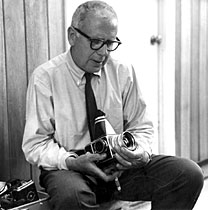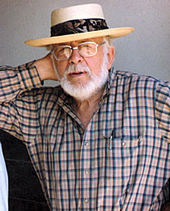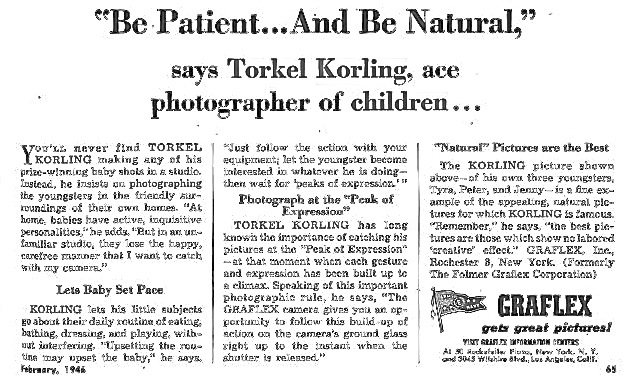torkel korling

Torkel Korling Photos Won Lasting Recognition
October 27, 1998 obituary by Anthony Burke Boylan, Chicago Tribune Staff Writer
Torkel Korling, 95, came to Chicago from Sweden in 1922 to become a botanist. Instead, he became a significant 20th Century photographer, winning recognition for industrial and commercial portraits, before returning to his love of nature.
He lived long enough to reconcile the two disciplines, photographing indigenous plant life across the Midwest and around the country while on corporate assignments. He published several books of his nature work that sold more than 100,000 copies over the last four decades.
Mr. Korling, an admirer of Johann Sebastian Bach, came from a 400-year line of Lutheran Church choir directors and organists in Kristdala, Sweden. His father, Felix, was the first in the Korling family to expand his musical career beyond the church, succeeding as a composer and conductor in Sweden, but Torkel Korling moved to the United States to escape the formality of his native country.
"Torkel really had three photographic careers," said Stephen Daiter, who owns a Chicago photography gallery and published a portfolio of Mr. Korling's mid-century industrial work. "First, he was an inventor who came up with two of the most important technical improvements in photography in the 20th Century."
Mr. Korling invented the first portable, collapsible tripods that have allowed photographers to move more freely. He also patented an automatic diaphragm that changed the way shutters work and paved the way for modern cameras.
"The second," Daiter said, "was from the 1920s through the 1950s. He was extensively published in Life Magazine and did annual reports for major companies. He was one of the really important commercial and industrial photographers. Later on, in his older age, he went back to plants for his third career."
Mr. Korling also was well known in Evanston, where he lived for most of his last two decades, frequenting coffeehouses and sidewalk cafes, and learning to ride the public transportation system at age 92, when he no longer could drive. Mr. Korling had also lived in Chicago, and on 20 acres near Dundee, which he helped design and which featured an arboretum frequently used for his nature studies.
"He was a regular, but I don't know if customer is the right word. He didn't do much buying," said Roger Carlson, who opened Bookman's Alley in Evanston 19 years ago and got to know Mr. Korling from his frequent visits to the bookstore. "He always seemed to choose a way of photographing things that pleased him entirely, but not necessarily the economic enginethat would have made him a lot more money."
Friends recalled him as a man passionate about his work, dogged in his pursuit of ideas and artistic to the point of being stubborn.
Mr. Korling is survived by his former wife, Diane Fawcett Korling; a son, Peter Felix Korling; and two daughters, Jenny Korling Nowlen and Annika Korling.
A memorial gathering will be at Bookman's Alley, 1712 Sherman Ave. in Evanston, from 6 p.m. to 9 p.m. Tuesday.
October 27, 1998 obituary by Anthony Burke Boylan, Chicago Tribune Staff Writer
Torkel Korling, 95, came to Chicago from Sweden in 1922 to become a botanist. Instead, he became a significant 20th Century photographer, winning recognition for industrial and commercial portraits, before returning to his love of nature.
He lived long enough to reconcile the two disciplines, photographing indigenous plant life across the Midwest and around the country while on corporate assignments. He published several books of his nature work that sold more than 100,000 copies over the last four decades.
Mr. Korling, an admirer of Johann Sebastian Bach, came from a 400-year line of Lutheran Church choir directors and organists in Kristdala, Sweden. His father, Felix, was the first in the Korling family to expand his musical career beyond the church, succeeding as a composer and conductor in Sweden, but Torkel Korling moved to the United States to escape the formality of his native country.
"Torkel really had three photographic careers," said Stephen Daiter, who owns a Chicago photography gallery and published a portfolio of Mr. Korling's mid-century industrial work. "First, he was an inventor who came up with two of the most important technical improvements in photography in the 20th Century."
Mr. Korling invented the first portable, collapsible tripods that have allowed photographers to move more freely. He also patented an automatic diaphragm that changed the way shutters work and paved the way for modern cameras.
"The second," Daiter said, "was from the 1920s through the 1950s. He was extensively published in Life Magazine and did annual reports for major companies. He was one of the really important commercial and industrial photographers. Later on, in his older age, he went back to plants for his third career."
Mr. Korling also was well known in Evanston, where he lived for most of his last two decades, frequenting coffeehouses and sidewalk cafes, and learning to ride the public transportation system at age 92, when he no longer could drive. Mr. Korling had also lived in Chicago, and on 20 acres near Dundee, which he helped design and which featured an arboretum frequently used for his nature studies.
"He was a regular, but I don't know if customer is the right word. He didn't do much buying," said Roger Carlson, who opened Bookman's Alley in Evanston 19 years ago and got to know Mr. Korling from his frequent visits to the bookstore. "He always seemed to choose a way of photographing things that pleased him entirely, but not necessarily the economic enginethat would have made him a lot more money."
Friends recalled him as a man passionate about his work, dogged in his pursuit of ideas and artistic to the point of being stubborn.
Mr. Korling is survived by his former wife, Diane Fawcett Korling; a son, Peter Felix Korling; and two daughters, Jenny Korling Nowlen and Annika Korling.
A memorial gathering will be at Bookman's Alley, 1712 Sherman Ave. in Evanston, from 6 p.m. to 9 p.m. Tuesday.

